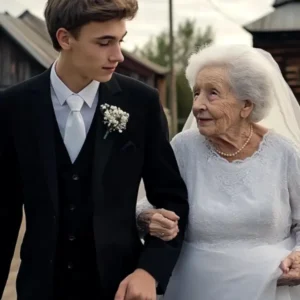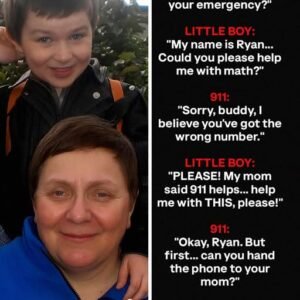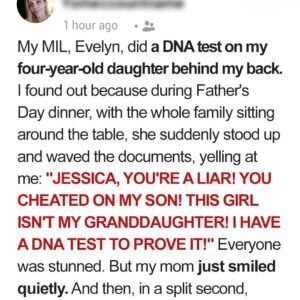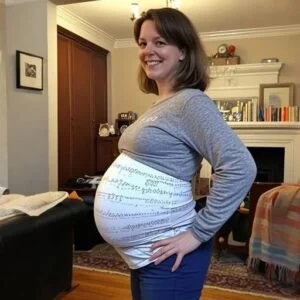When Grandma Elinor passed, I thought the loneliness would be the hardest part. She was the only real family I had left—Mom died when I was ten, and my father was never in the picture. Grandma raised me with firm hands and warm meals, and I stayed by her side every day during those last six months in the hospital. Losing her felt like losing my anchor to the world.
After the funeral, I sat stiffly in the lawyer’s office, barely holding myself together. He opened her will with the kind of practiced gentleness lawyers use when they know what’s coming might shake you.
“She left you the house,” he said. “Fully paid off. No debts.”
Then he handed me something else: a letter.
“Marie,
If you’re reading this, it means I didn’t make it back home. Burn everything in the attic. Don’t look. Don’t open. Just burn it. It’s important. I love you.
Grandma.”
I laughed, a little startled. “She wanted me to burn the attic?”
“It’s a personal note,” the lawyer clarified. “Not part of the legal will.”
Still, it stayed with me. That night, I stood under the attic hatch and stared up, her words echoing in my head. Burn everything. But how could I? That attic held pieces of her—of us.
Curiosity won. I pulled the ladder down, climbed into the dust, and started sifting through boxes. Old birthday cards, my crayon drawings, her knitted mittens. I smiled through tears as memories flooded back.
But then I found the chest.
It was large, weather-worn, locked tight. I’d never seen it before. I remembered Grandma’s old jewelry box, the one she kept near her bed. Sure enough, inside it, tucked under the velvet lining, was a tiny, rusted key.
It fit perfectly.
Inside the chest were letters. Dozens. Tied with twine. And photos—one of me, a little girl, holding hands with a man I didn’t recognize.
On the back: My son and my granddaughter. Thomas and Marie.
My breath caught.
The letters were addressed to Grandma. Pleading letters.
“Please let me see her. Just once.”
“Does she remember me?”
“I miss her laugh.”
Each one was a dagger. I’d grown up believing I had no father. But here he was—writing, begging, reaching out.
Why had she hidden this from me?
One letter in particular was dated the year I turned five—the year we moved. After that, nothing. The letters stopped.
I slipped one into my coat pocket. I need to find him. If he’s still out there, I deserve answers.
It took a few days, but I tracked down the address from the letters. I found the house. And then… I found him.
He opened the door with disbelief in his eyes. “Marie?”
He hugged me tight, laughed like he’d won the lottery. We went out for pizza. He watched me like he couldn’t believe I was real. He told me stories, asked questions, listened like a man trying to catch up on a lifetime.
But he never let me inside his house.
When I offered to stay and talk longer, he deflected.
“Let’s go to your place,” he insisted. “I’d love to see Grandma’s house.”
“It’s late,” I hesitated. “It’s 80 miles away.”
“I’d rather go tonight,” he said, voice suddenly sharp.
That should’ve been the red flag. But I was starved for connection. I wanted to believe in him so badly. So I said yes.
That night, I gave him the couch and went to bed. But I woke up to creaking upstairs.
I climbed the attic ladder and found him—tearing through Grandma’s chest.
“What are you doing?” I asked.
He snapped. “Close your ears and go back to sleep!”
Gone was the sweet man from the pizzeria. He was muttering to himself, tossing photos and papers like garbage.
“Dad, what are you looking for?”
He turned, sneering. “None of your business, kid. I’ve waited years for this. No more sneaking into this house. I’m moving in.”
He waved an old, dusty document. “Half the house is mine. I signed it with your grandma decades ago.”
“No,” I protested. “She left it to me. I have the will.”
He laughed. “She lied to you. She kept me from you. Blamed me for your mother dying.”
“She died because she was sick,” I said, voice trembling.
He scoffed. “She was emotional. I had a few drinks. That’s not a crime.”
I backed away. “You should leave.”
“Oh no, sweetheart,” he said, tone icy. “I live here now. You’ll cook. Clean. Be a good little daughter. Or find somewhere else.”
“Get out,” I whispered.
He just smiled. “Daddy’s home.”
The next week was a blur of cigarette smoke, slammed doors, and shouted orders. He changed the locks. Treated me like a maid. I stopped crying after the first day. Instead, I made a decision.
If he could dig through our past, so could I.
I returned to the address—the house he’d claimed as his. This time, a woman opened the door. She was about my age. Her expression shifted the second I said my name.
“You’re Marie?” she asked. “He found you?”
We sat together in the living room, a strange warmth between strangers.
“He said he was your boyfriend,” I said.
She snorted. “He’s not. He’s my father. And I’ve been trying to get him out of this house for years.”
We stared at each other, realization dawning.
“I think I’m your stepsister,” I said slowly.
“I’m Olivia,” she replied. “But we don’t have time for that.”
Within two weeks, we hired a lawyer. Scraped together savings. Found an old neighbor who remembered Grandma updating the deed. And that’s when we learned the truth.
The original contract was null. He hadn’t paid taxes or maintained the home in over fifteen years. The house was legally mine.
And he? He had a record—assault, petty theft, restraining order violations. The court had no trouble removing him.
When the judge handed down the order, Olivia and I locked eyes. We didn’t say a word. We didn’t need to.
Later, as we walked out of the courtroom, she turned to me and said, “I always wanted a sister.”
I smiled. “I always wanted to stop feeling alone.”
And we did. Together.
No longer daughters of a monster. No longer defined by the lies.
Just two women. Free.





